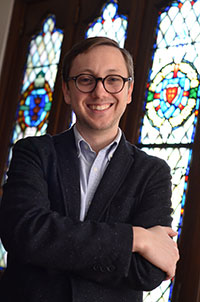
Timothy K. Snyder is a 2014 Louisville Institute Doctoral Fellow and Managing Director of StudyingCongregations.org.
LI: Tell us about yourself and your doctoral program.
TS: This is my fourth year in the PhD program at Boston University School of Theology, where I’m studying practical theology with a specialization in church and society.
I live here in Boston with my partner, Lindsey, who works as an event coordinator for a non-profit. We’re quite active in our home congregation, Faith Lutheran Church where we teach Sunday School to kids ages 3-9. My doctoral program has prepared me to answer, well, most of their questions.
LI: With respect to your studies, what question currently matters to you and why?
TS: In all of my theological work, I’m trying to ask questions about the relationship between academic and lived theologies. What difference does it all make? Is theology just texts about texts, or does it have a life in our churches and our communities?
This question matters to me because faith in the modern world is a challenge, its complicated, and both the formal discourses of academic theology and the everyday discourses of lived faith have something to offer. The problem is neither are that great at taking the other seriously.
LI: In what ways has the LI Doctoral Fellowship supported your formation as a theological educator?
TS: Two things. One, is that while most of our doctoral programs train us to be scholars in our specialized disciplines, there aren’t many chances to think about our work within the context of theological education which today brings a whole variety of challenges. Two, the actual fellowship I’ve found in my cohort comes at the perfect time. Just as coursework ends and our doctoral work becomes more solitary, this cohort has provided a vital community, one of faith and learning. Of course at the end of our programs there will be just one name on the dissertation, but that’s always partially untrue. We do this work in debt to those who walk with us along the way. This kind of support here surprised me, but I’m very grateful for it.
LI: How would you advise eligible doctoral students who are interested in applying for this fellowship?
TS: It’s helpful, I think, if you can locate yourself within the diversity of theological education: stand alone seminaries, university-based divinity schools, undergraduate programs, Catholic contexts, etc. They all bring their own particularities and it’s helpful if you can situate yourself on the map. But more than anything else, write the best essay you can. Write thoughtfully and creatively. Really demonstrate your commitment to the academy and the church.